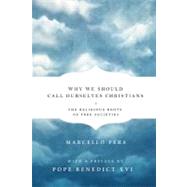
What is included with this book?
| Forword | p. vii |
| Introduction: When our House Catches Fire | p. 1 |
| Liberalism, the Secular Equation, and the Question of Christianity | |
| Liberalism at the Crossroads | p. 13 |
| The Apostasy of Christianity | p. 20 |
| The Secular Equation | p. 25 |
| Liberalism and Anticlericalism | p. 33 |
| In the Name of the Fathers | p. 40 |
| Why Liberals Should Call Themselves Christians | p. 46 |
| Should we Call or Can we Help Calling Ourselves Christians? | p. 51 |
| As if God Existed | p. 56 |
| Europe, Christianity, and the Question of Identity | |
| What Is Europe? | p. 61 |
| The Problem of the Soul | p. 74 |
| The Paradox of European Identity | p. 76 |
| Constitutional Patriotism | p. 83 |
| The Ethical Deficit: The Human Person | p. 90 |
| The Poverty of Secularism | p. 95 |
| Why Europe Should Call Itself Christian | p. 100 |
| Relativism, Fundamentalism, and the Question of Morals | |
| "Better": Are we Allowed to use that Word? | p. 107 |
| Relativism | p. 112 |
| Multiculturalism | p. 119 |
| Integration and Conversion | p. 125 |
| Islamic Fundamentalism and Interreligious Dialogue | p. 129 |
| The Expropriation of Morals | p. 140 |
| The Descending Trajectory of Public Liberal Ethics | p. 149 |
| To Conclude: Why We Should Call Ourselves Christians | p. 157 |
| Notes | p. 163 |
| Bibliogrophy | p. 191 |
| Index | p. 211 |
| Table of Contents provided by Ingram. All Rights Reserved. |
The New copy of this book will include any supplemental materials advertised. Please check the title of the book to determine if it should include any access cards, study guides, lab manuals, CDs, etc.
The Used, Rental and eBook copies of this book are not guaranteed to include any supplemental materials. Typically, only the book itself is included. This is true even if the title states it includes any access cards, study guides, lab manuals, CDs, etc.